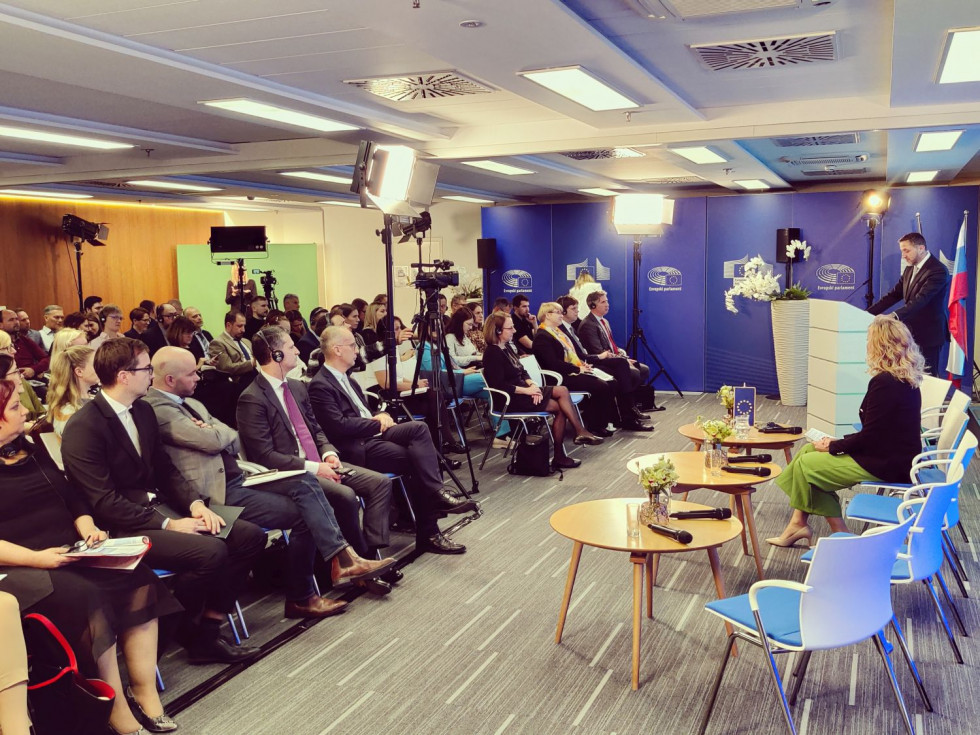Annual event of the Recovery and Resilience Plan discusses the impact of the double transition for sustainable economic growth
Opening addresses were delivered by Minister of Finance Klemen Boštjančič and Director General of the Recovery and Resilience Task Force at the European Commission Céline Gauer.
Minister Klemen Boštjančič said that the year 2023 was very important from the aspect of the Recovery and Resilience Plan. “At the end of the year, Slovenia received a payment of EUR 536 million in relation to its second request. By reaching 44 milestones and goals of the second request for payment, we entered 2024 with a nice incentive for further hard work on the reforms and investments of the Recovery and Resilience Plan,” he stressed.
As Minister Boštjančič noted, Slovenia is entering the most intensive period of the Recovery and Resilience Plan in terms of reform and investment. “After the successful completion of work on the railway stations in Grosuplje and Domžale, work on the station in Nova Gorica began last weekend. Not far from here you can observe the beginnings of the transformation of our central railway station. The foundation stone of the new Faculty of Veterinary Medicine has been laid, and today a foundation stone will also be laid in Vrazov Square, where the new Campus of the Faculty of Medicine of the University of Ljubljana will be erected. At the same time, we must not forget the financially less extensive, but just as effective projects that strengthen the economy and help develop society,” he said and highlighted today's event as a good opportunity to present experience in the field of the green and digital transition.
“We live in complex times that demand that we respond quickly and constantly adapt. This is why it is important to ensure resilient social systems. We will be successful in this only if we address the challenges of the future and complete our homework, which has not yet been done,” stressed Minister Boštjančič and noted the important reform measures to which the state has committed itself as part of the Recovery and Resilience Plan.
In her opening statement to the event, Céline Gauer, Head of the European Commission's Recovery and Resilience Task Force, commended Slovenia for its last year's remarkable achievements in implementing the Recovery and Resilience Plan. In particular, she highlighted the inclusion of the REPowerEU chapter in last year's amendment to the Recovery and Resilience Plan, which will help address the impact of the energy crisis, facilitate the energy transition and reduce dependence on fossil fuels. "Slovenia has been very active in implementing its measures and investments. It has now secured about one third of the total funds available to the country under this programme, which is a significant achievement," said Céline Gauer. Looking ahead, however, she stressed the importance of starting to address the challenges of 2024, which will be a decisive year.
The event was also attended by State Secretary Matevž Frangež from the Ministry of Economy, Tourism and Sport. Speaking at a panel discussion on green investment in business, he said: "We are going through a period of major economic transformation, which the Ministry sees as an opportunity and is focusing on helping the Slovenian economy in particular to strengthen our self-confidence and our ability to manage this transition efficiently and quickly. I am referring to the three pillars of modernising and decarbonising existing industries, developing new end products and new industries, with a particular focus on fostering a dynamic start-up community. We need to channel our funding towards those projects that represent a major breakthrough and a major network effect," he added.
On the sidelines of the annual RRP event, the foundation stone will be laid for the Vrazov Square Campus of the Faculty of Medicine of the University of Ljubljana, which is one of the most financially extensive projects of the RRP. The ceremony will be attended by Director General Céline Gauer, Minister of Higher Education, Science and Innovation Igor Papič, Rector of the University of Ljubljana Gregor Majdič and Dean of the Faculty of Medicine of the University of Ljubljana Igor Švab.
Additional information about the implementation of the Recovery and Resilience Plan: noo.gov.si.


